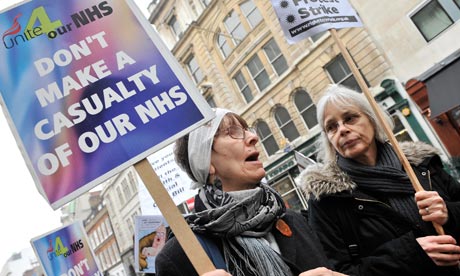The BMA, meeting this week, must end its policy of appeasement and start opposing the 'reforms' instead

Supporters of the NHS protest outside a BMA meeting during the passage of the bill. Photograph: Andy Rain/EPA
This week hundreds of doctors meeting for the annual BMA conference in Edinburgh will debate the wreckage left by Lansley's Health and Social Care Act. When first proposed in 2010 hopes ran high after the government promised that spending decisions would go to GPs and power to patients. But the profession is now contemplating the betrayal of those promises, as cuts lead to rationing and GPs are forced to tender out all services to the private sector. As one GP grimly remarked: "We've got less money, more complexity and all of the blame."
But it is not only the politicians who have betrayed the NHS. The media, who should have asked hard questions as the Act passed through parliament, and the medical establishment, who should have stood up to the government, share the blame. It is no surprise that the Tories betrayed the NHS. In his book Never Again, Nick Timmins describes how Lansley's initial plans for the NHS were redrafted by Oliver Letwin and Danny Alexander. Letwin, at the heart of Tory policy-making for 25 years and author of Privatising the World, reportedly told a meeting that the "NHS will not exist" within five years of a Conservative election victory, and he is close to being proved right. That the Lib Dems went along with this against the wishes of their supporters was a shocking violation of their party's democratic processes. Without Lib Dem support, a minority Conservative government could not have passed this legislation.
It is not the responsibility of the media to blindly defend the NHS but it is their job, as Lord Justice Leveson said, to provide an "essential check on all aspects of public life" – and with a few exceptions they failed in their duty. The BBC, trusted and relied on for in-depth political coverage, frequently acted like a mouthpiece for the government, regurgitating the official mantra that the bill was about "putting patients at the heart of the NHS" and "empowering GPs". This was still the line on the day the bill, by then the subject of a long bitter battle, was passed. Important stories, including the web of financial interests behind the bill, were ignored.
The failure of the medical establishment to recognise the dangers and oppose the "reforms" is the most difficult thing to explain. The medical royal colleges, with the notable exception of the RCGP led by Clare Gerada, were myopic and supine. They focused on details while ignoring the real threat – that it would be impossible to deliver their remit of high standards of medical training and patient care within an NHS that was being broken up and tendered out to the private sector. The BMA's response was led by influential GPs, many of whom were naturally attracted by the prospect of holding the majority of the NHS budget. Their initial policy of "critical engagement" was pursued long after it became clear that the government had no intention of engaging. Surveys conducted by other organisations showed the profession overwhelmingly rejected Lansley's proposals but the BMA never consulted its 150,000 members about the possibility of opposing the reforms or of a boycott of the increasingly discredited GP commissioning. If the medical establishment had been united it could have brought down bill which purported to put clinicians in charge, but the leaders of the profession vacillated, prevaricated and ultimately failed the test.
What might the BMA do to redeem its failure to fight the Act? It could begin by spending some of its considerable resources on a high-profile campaign to tell the public why the NHS is in danger and what we stand to lose if we don't defend it. It should ensure that the NHS becomes an election issue in 2015, hold Labour to its promise to repeal the Act and back Lord Owen's bill to restore the secretary of state's responsibility for the NHS. It should produce evidence to counter the self-serving attacks by politicians on the service, including closures masquerading as "reconfigurations", and it should defend its staff when they are blamed for the chaos that is a result of "reforms". And since the holy grail of GP commissioning is turning to base metal before our eyes it should "critically engage" its members on whether they think it's time to withdraw from the process. It should rediscover its voice as a trade union, abandon appeasement and come out fighting.